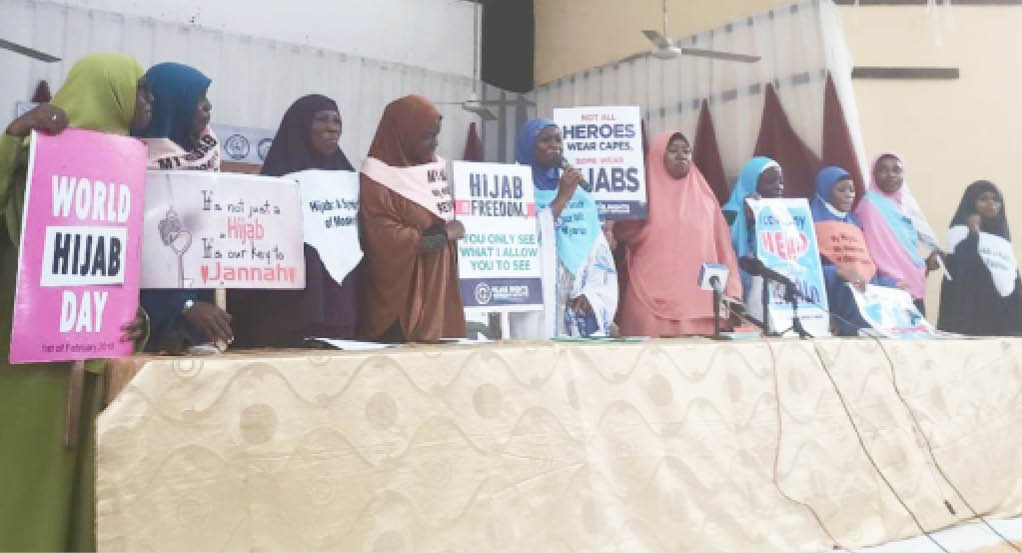Muslim women seek actions against anti-hijab sentiments
Some countries continue to deprive women of their right to choose to wear the hijab whenever they want, and some women fear they may not be allowed to wear it at all, according to the organisers of a global hijab-awareness event. Thousands of women around the world, of all religions and backgrounds, marked the 10th […]

Participants at the Press Conference to mark the World Hijab Day in Lagos on Tuesday
Some countries continue to deprive women of their right to choose to wear the hijab whenever they want, and some women fear they may not be allowed to wear it at all, according to the organisers of a global hijab-awareness event.
Thousands of women around the world, of all religions and backgrounds, marked the 10th annual World Hijab Day on Tuesday by posting selfies on social media with the hashtag #DressedNotOppressed.
“Unfortunately, there are some countries that want to ban our religious garments, (and this event) allows us to find more of the voices who are against this oppression (in the form) of denying our right to wear our religious garments,” a spokesperson for the World Hijab Day (WHD) Organization told Arab News.
This year, organisers of the event called on teachers around the world to stand in unity and solidarity with Fatemeh Anvari, a Canadian Muslim teacher who in December was removed from her classroom in a school in Quebec because she wears a hijab. Under a law passed in 2019, civil servants in “positions of authority” in the province are barred from wearing visible religious symbols at work.
World Hijab Day is celebrated each year on Feb. 1 and the non-profit organisation behind it was founded in 2013 by Bangladeshi American Nazma Khan with the aim of educating people and raising awareness of why many Muslim women choose to wear the hijab, and to encourage women to wear and experience it for a day.
WHD said that women who wear hijabs have to contend with a number of stereotypes surrounding them, including the idea that Islam is a violent religion, that the hijab is associated with terrorism, and that Muslim women are oppressed and forced to wear it.
“Speaking against these things because they are not true comes with criticism and backlash,” WHD said. “All we want is our freedom to wear what we want and be safe doing so.”
The degrees to which hijabi women have integrated into society differ around the world and each country or city presents its own particular challenges.
In Nigeria especially in the South, Muslim women continue to suffer harrassment for wearing the hijab, prompting calls on the authorities to take drastic action against discrimination.
In Kwara State, one person was feared dead and several others injured as protest by Muslim parents and students over the continuous denial of the use of hijab by the Oyun Baptist High School (OBHS), Ijagbo turned voilent on Thursday.
The Kwara state government had on January 25, 2022 restated its policy and directed management of schools in the state to allow the use of hijab and beret by willing students.
Federal University of Agriculture in Abeokuta (FUNAAB) Ogun state last year placed a ban on the use of hijab and niqab by Muslim female students on campus based on the flimsy reason of wanting to identify each student on campus.
In December 2021, Noheemat, a Muslim youth corps member posted to Akwa Ibom State was harassed and prevented from using hijab by the camp officials until Muslim groups and government authorities intervened.
“We call on all people, our fellow compatriots, institutions, leaders and those in positions of authority to see our hijab as an enabler not an inhibitor,” said the Coalition of Muslim Women in a press briefing in Abuja.
“They should treat hijab with respect and understanding, and as a tool and a vehicle for inclusiveness,” it added.
The coalition resolved that rather than engaging those it described as hijab harassers in open confrontation, it would not hesitate to challenge them in competent law courts.
